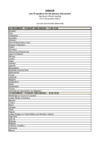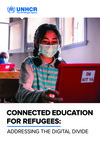Men, women and children suffering from harsh physical conditions and legal shortcomings at Pacific Island asylum centres: UNHCR reports
This is a summary of what was said by UNHCR spokesperson Adrian Edwards – to whom quoted text may be attributed – at today's press briefing at the Palais des Nations in Geneva.
In two reports released today, UNHCR finds that asylum-seekers transferred from Australia to processing centres at Nauru and Manus Island in Papua New Guinea (PNG) are living in arbitrary detention in conditions that do not meet international standards of treatment.
UNHCR understands Australia's determination to respond robustly to the challenges of people smuggling and to dissuade people from undertaking dangerous irregular travel by sea. However we believe those responses must not neglect the compelling protection needs, safety and dignity of the individuals affected.
These reports are also in the context of what UNHCR has observed to be a sharp deterioration during 2013 in the overall quality of protection and support available to asylum-seekers and refugees who come to Australia by boat. It remains the case that when policies and practices are based primarily on deterrence, they can have harmful and, at times, punishing consequences for people affected, particularly families and children.
The reports identify troubling shortcomings at both centres, and urge all three States involved to consider the findings and recommendations and act upon them.
In both Nauru and PNG the current policies, operational approaches and harsh physical conditions at the centres not only do not meet international standards - they also have a profound impact on the men, women and children housed there.
UNHCR is concerned that they constitute mandatory detention which is not compatible with international law. We are also worried that they do not provide a fair and efficient system for assessing refugee claims, do not provide safe and humane conditions of treatment in detention, and do not provide for adequate and timely solutions for recognized refugees.
With the Nauru report, it acknowledges some positive developments since our last visit in March. However, there have also been significant setbacks in refugee processing, and a deterioration in reception conditions. Despite a processing system being in place under Nauru law, only one decision has been handed down in the 14 months since the centre reopened.
No decisions at all have been finalized at the centre in PNG, and while some improvements were observed since UNHCR's last inspection in June, the physical conditions within detention, together with the slowness of processing and the lack of clarity regarding safe and sustainable solutions for refugees were likely, together, to have a serious and negative effect on the health and welfare of people transferred from Australia.
At both centres, the psycho-social well-being of vulnerable people - including survivors of torture and trauma and unaccompanied children - is an issue of concern. UNHCR also called on all three States not to transfer children, particularly those who are unaccompanied, unless and until there has been a marked improvement in conditions in both centres.
UNHCR is particularly concerned by the impact of policies that will prevent recognized refugees from finding safe, dignified and sustainable solutions in the medium to long term. The prospect for refugees in PNG finding permanent protection there presents formidable challenges, and it is clear that Nauru will offer only very limited opportunities for refugees even in the shorter term.
UNHCR believes the arrangements at Nauru and PNG would benefit from a much clearer articulation of the policy and operational framework that would set out how, when and where refugees will be able to secure protection and exercise the rights required under the 1951 Refugee Convention.
The full reports, including recommendations, are available at: www.unhcr.org.au
For more information on this topic, please contact:
- In Canberra (Regional): Ben Farrell on mobile +61 407 971 686
- In Geneva: Adrian Edwards on mobile +41 79 557 91 20
- Babar Baloch on mobile +41 79 557 9106
Related news and stories
Global photo project shows power of football during displacement
The Kenyan powerhouse improving women's lives in Australia
UN refugee chief welcomes cities' support for refugees
UNHCR appeals to Australia to act and save lives at immediate risk
UNHCR urges Australia to end separation of refugee families
'We must believe we can make a difference and we can do things better' - Andrew Harper
-

Statement of UNDP Opening by Mr. Achim STEINER
14 Dec 2021 -

Statement of Japan Spotlight session
14 Dec 2021 -

Statement of Turkey_ Ms. Fatma ŞAHİN (Turkish)
14 Dec 2021 -

Employment Pathways
-

Refugee women scale Atlas mountain to tackle gender violence
13 Dec 2021 An all-female group including 13 refugees from six countries set out to climb Mount Toubkal – Morocco's highest peak – to highlight the struggle to end violence against women. -

Rapid analysis on meaningful participation pledges
13 Dec 2021 The infographic provides an overview of pledges related to meaningful refugee participation submitted at the Global Refugee Forum. The analysis includes both pledges that have meaningful participation as a main objective and pledges that specifically mention the intention to involve persons of concern in implementing its activities. -

High-level Officials Meeting List of speakers
13 Dec 2021 List of speakers for the High-Level Officials Meeting (December 2021). -

Connected Education for Refugees: Addressing the Digital Divide
13 Dec 2021 UNHCR released the Connected Education For Refugees: Addressing the Digital Divide report that provides an overview of the current status and challenges faced by refugees in accessing digital learning opportunities during the COVID-19 pandemic. The report also highlights the additional measures taken to extend access to refugee-hosting communities, putting forward recommendations on how to better design for more inclusive digital learning programmes that can benefit all learners. -

Operational Strategy for Climate Resilience and Environmental Sustainability 2022-2025
13 Dec 2021 This document explains UNHCR's plan of action to mitigate the impact of climate change on forcibly displaced people and their hosts, support their resilience and minimize the environmental footprint of humanitarian assistance. The strategy aims to improve the predictability of UNHCR's engagement in responding to emergencies brought on by climate-related and other natural hazards; incorporate climate and environmental considerations into responses; and improve the sustainability of the end-to-end supply chain.
